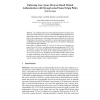Free Online Productivity Tools
i2Speak
i2Symbol
i2OCR
iTex2Img
iWeb2Print
iWeb2Shot
i2Type
iPdf2Split
iPdf2Merge
i2Bopomofo
i2Arabic
i2Style
i2Image
i2PDF
iLatex2Rtf
Sci2ools
ACISP
2008
Springer
2008
Springer
Enforcing User-Aware Browser-Based Mutual Authentication with Strong Locked Same Origin Policy
The standard solution for mutual authentication between human users and servers on the Internet is to execute a TLS handshake during which the server authenticates using a X.509 certificate followed by the authentication of the user either with own password or with some cookie stored within the user’s browser. Unfortunately, this solution is susceptible to various impersonation attacks such as phishing as it turned out that average Internet users are unable to authenticate servers based on their certificates. In this paper we address security of cookie-based authentication using the concept of strong locked same origin policy for browsers introduced at ACM CCS’07. We describe a cookie-based authentication protocol between human users and TLS-servers and prove its security in the extended formal model for browserbased mutual authentication introduced at ACM ASIACCS’08. It turns out that the small modification of the browser’s security policy is sufficient to achieve provably...
ACISP 2008 | Cookie-based Authentication | Cookie-based Authentication Protocols | Mutual Authentication | Security Privacy |
| Added | 01 Jun 2010 |
| Updated | 01 Jun 2010 |
| Type | Conference |
| Year | 2008 |
| Where | ACISP |
| Authors | Sebastian Gajek, Mark Manulis, Jörg Schwenk |
Comments (0)

